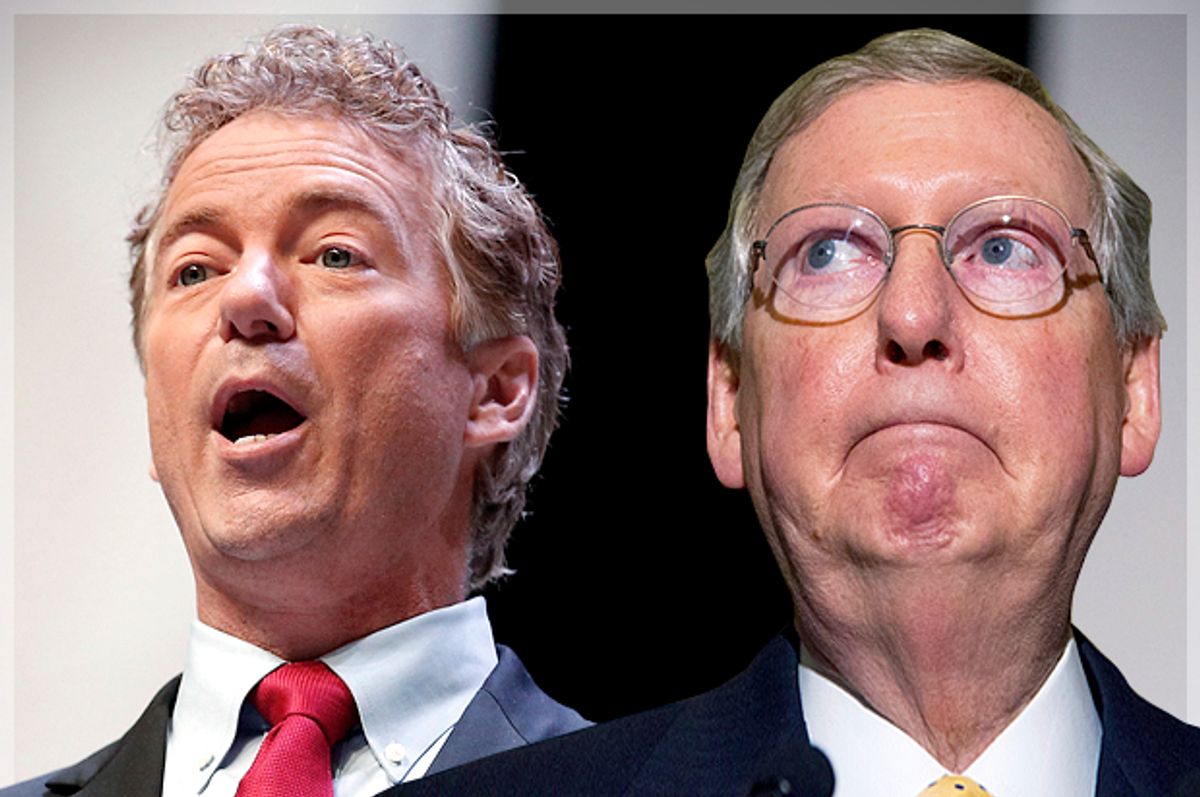In October 2014, Rand Paul was a political asset for Mitch McConnell. McConnell, then Senate minority leader, was in the last stages of a reelection fight against Allison Lundergan Grimes, and the pitch he made to Kentucky voters was a simple one: I am a very powerful man, and if I become majority leader, I’ll be even more powerful, which will be good for Kentucky. In the last week of the campaign, he hit the trail with Sen. Rand Paul in tow – Paul’s job approval numbers in the state were much stronger than McConnell’s, so it helped to have the popular, young, Tea Party favorite campaign on his behalf.
But McConnell also used Paul’s own political ambitions to bolster his message about giving Kentucky a disproportionately large amount of influence in Washington, DC. “Earlier in the week, McConnell had crisscrossed the state with Kentucky’s other senator, the more popular Rand Paul, telling voters they had an opportunity to play a rare outsized role in national politics,” MSNBC’s Irin Carmon wrote at the time. “The implication: Mitch McConnell as Senate Majority Leader, Rand Paul as president.”
Oh how things have changed in a year. McConnell won his chance at being majority leader and immediately announced that he would endorse Paul for president in 2016, should he run. Paul announced his presidential campaign, as everyone expected he would, and then everything fell apart. Paul’s poll numbers, both nationally and in the early states, cratered over the summer and haven’t bounced back. His fundraising dried up, his campaign was beset by leaks and infighting, and the candidate lurched between gimmicky stunts and fruitless confrontations with Donald Trump. The only press Rand can seem to get is when he announces to reporters that he’s not dropping out of the race.
McConnell has stuck with Paul through all of this, and even used his clout to help Rand get around a Kentucky law that would have prevented him from running for president and for reelection to the Senate at the same time. Paul pressured the Kentucky GOP to scrap its presidential primary and instead hold a caucus, which would carve out the loophole Rand needed to run for both offices. But he did such a poor job convincing the state party that his withering presidential prospects were worth the effort that McConnell’s people had to step in and broker the deal that allowed the arrangement to go forward. McConnell has an obvious interest in maintaining Rand’s viability as an incumbent Senate candidate, given the rough electoral map that threatens his newly-won leadership.
But it looks like McConnell is finally running out of patience with Paul’s presidential fantasizing. As Politico reported last week, McConnell and the National Republican Senatorial Committee are “quietly ratcheting up pressure on Rand Paul to pay more attention to his Senate reelection next year — and less to his flagging 2016 presidential candidacy.” At the heart of their concern is money; Paul has raised scant amounts of cash for his Senate bid and has transferred over a million dollars from his Senate reelection fund to his presidential campaign earlier this year. And as Politico notes, there isn’t much concern that Paul would lose his Senate race, but McConnell and the NRSC don’t want to have to spend money on a safe seat that could otherwise be used to defend vulnerable incumbents elsewhere (of which there is no shortage).
Paul also has to worry about his relationship with the state party. They went to great trouble to create a presidential caucus especially for him, in spite of their misgivings about his viability as a presidential candidate. If he’s seen as jeopardizing his state office (or the other Kentucky senator’s position of authority) because he’s too stubborn or proud to admit that he doesn’t have a chance at the White House, that’s not going to go over well with the people he’s already indebted to politically.
McConnell souring on his junior senator’s 2016 hopes is bad news for Kentucky voters who were hoping a president and a Senate majority leader from the Bluegrass State could tag-team some legislation to end the “War On Coal” and bring back the Kentucky coal jobs that have disappeared forever. But more than anything it represents a turning point for Rand Paul.
Up to now, Rand could dismiss the neverending stream of “Rand Paul death watch” stories as empty speculation or troublesome liberal media types just stirring up trouble. It’s a whole different animal when your party’s establishment, led by the leader of the Senate (who also endorsed you for president) is telling you that maybe it’s time to pack things up and get serious about your day job.

Shares